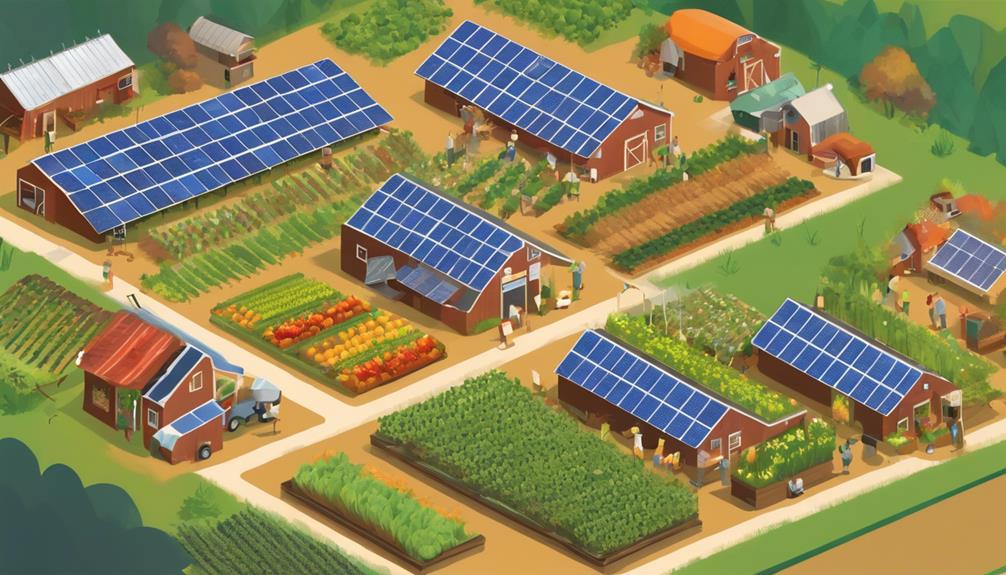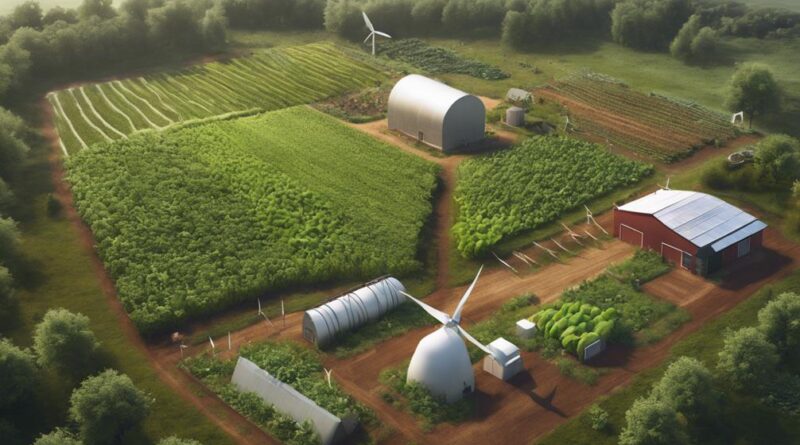Promoting Sustainability Through Natural Agriculture Methods
By adopting natural agriculture methods, you actively support sustainability, minimize synthetic chemical use, and preserve soil health. Promoting biodiversity enhances ecological balance, creates pollinator habitats, and attracts beneficial insects. Water conservation through practices like rainwater harvesting and sustainable irrigation fosters long-term sustainability. Reduced chemical usage not only boosts soil health but also aids in natural pest control. Embracing climate-smart practices ensures resilience against changing conditions, adapting to mitigate climate impact efficiently. Understanding the economic viability of organic farming reveals stable markets and premium prices. Contributing to a healthier ecosystem through natural agriculture methods leads to a more sustainable future.
Importance of Organic Farming
Organic farming plays a crucial role in promoting sustainability by minimizing the use of synthetic chemicals and preserving soil health. Consumer awareness of the environmental benefits associated with organic farming has been steadily increasing in recent years. People are becoming more conscious of the impact their food choices have on the environment. This shift in consumer behavior towards supporting sustainable practices has led to a growing demand for organic products, thereby encouraging more farmers to adopt organic farming methods.
Sustainable practices in organic farming contribute significantly to food security. By avoiding the use of synthetic pesticides and fertilizers, organic farming helps maintain the biodiversity of ecosystems and ensures the long-term productivity of the land. This is crucial for securing the availability of nutritious food for future generations. Additionally, organic farming promotes healthier soil by fostering natural nutrient cycling processes and supporting beneficial soil organisms.
The combination of consumer awareness, environmental benefits, sustainable practices, and enhanced food security positions organic farming as a key player in the movement towards a more sustainable agricultural system. It presents a viable solution to the challenges posed by conventional farming methods, offering a way to produce food that's both environmentally friendly and economically viable in the long run. By supporting organic farming, individuals can contribute to a healthier planet and a more secure food future for all.
Soil Health and Organic Practices
Amid the growing concerns over soil degradation and agricultural sustainability, implementing natural farming methods can significantly improve soil health and productivity. By focusing on soil health and organic practices, you can actively contribute to sustainable agriculture.
Here are four key strategies to consider:
- Soil Regeneration: Organic practices such as cover cropping and crop rotation help restore soil health by promoting microbial activity and enhancing soil structure. These methods reduce erosion, increase water retention, and foster nutrient availability, leading to improved soil fertility over time.
- Nutrient Cycling: Adopting organic practices encourages the recycling of nutrients within the ecosystem. By using compost, manure, and other natural soil amendments, you can replenish essential nutrients in the soil, reducing the need for synthetic fertilizers. This not only benefits the environment by minimizing chemical runoff but also supports long-term soil productivity.
- Diverse Planting: Implementing diverse crop rotations and intercropping systems can enhance nutrient cycling and promote soil biodiversity. Different plants have varying nutrient requirements and root structures, which can help prevent nutrient depletion and improve overall soil health.
- Reduced Soil Disturbance: Minimizing tillage practices helps maintain soil structure and preserve beneficial soil organisms. Reduced soil disturbance promotes a healthy soil ecosystem, contributing to better water infiltration, carbon sequestration, and overall soil resilience.
Biodiversity Enhancement in Farming
To further enhance the sustainability of agricultural practices and foster a resilient ecosystem, a crucial aspect to consider is promoting biodiversity in farming methods. Biodiversity plays a vital role in maintaining ecological balance, enhancing soil fertility, and increasing overall farm productivity.
One effective method to promote biodiversity is through crop rotation. By rotating crops, farmers can prevent the depletion of specific nutrients from the soil, reduce the prevalence of pests and diseases, and improve soil structure. This practice also encourages the growth of different plant species, which can attract a diverse range of beneficial insects and microorganisms to the farm.
Creating pollinator habitats is another essential strategy to enhance biodiversity on farms. Pollinators, such as bees, butterflies, and birds, play a crucial role in the pollination of crops, contributing to higher yields and better quality produce. Establishing pollinator-friendly habitats with a variety of flowering plants can help support these important species and ensure successful pollination across different crops. Moreover, promoting pollinator habitats can also contribute to the overall health of the ecosystem by supporting a diverse community of wildlife.
Incorporating crop rotation and creating pollinator habitats are practical approaches that not only enhance biodiversity in farming but also contribute to the long-term sustainability of agricultural practices. By implementing these strategies, farmers can build resilient ecosystems that are more resistant to environmental stressors, ultimately leading to more productive and sustainable agricultural systems.
Water Conservation and Organic Methods
Integrating efficient water conservation practices with organic methods is imperative for maximizing agricultural sustainability and minimizing environmental impact. By incorporating techniques like rainwater harvesting and sustainable irrigation, you can significantly reduce water usage on your farm. Implementing permaculture design principles and embracing regenerative agriculture practices can further enhance your water conservation efforts.
Here are four key strategies to help you achieve water conservation and organic farming success:
- Rainwater Harvesting: Capture and store rainwater to supplement irrigation needs, reducing reliance on traditional water sources and promoting self-sufficiency.
- Sustainable Irrigation: Utilize drip irrigation systems or mulching techniques to deliver water directly to plant roots, minimizing waste and maximizing efficiency.
- Permaculture Design: Design your farm layout to mimic natural ecosystems, creating diverse and water-efficient landscapes that work in harmony with the environment.
- Regenerative Agriculture: Focus on building soil health and biodiversity to increase water retention capacity, reducing runoff and erosion while promoting long-term sustainability.
Reduced Chemical Usage Benefits
Reducing chemical usage in agriculture offers numerous benefits, including improved soil health, decreased environmental pollution, and enhanced long-term sustainability. By adopting natural pest control methods and sustainable farming practices, farmers can significantly reduce their reliance on harmful chemicals while reaping various advantages.
One of the primary benefits of minimizing chemical inputs is the promotion of natural pest control mechanisms. Implementing sustainable farming practices such as crop rotation, intercropping, and maintaining biodiversity helps create balanced ecosystems where beneficial insects thrive, keeping pest populations in check without the need for chemical interventions. This not only reduces the environmental impact of pesticides but also preserves beneficial organisms crucial for ecosystem health.
Moreover, sustainable farming practices like cover cropping and organic soil amendments improve soil structure and fertility, making crops more resilient to pests and diseases. Healthy soils foster robust root systems, enhancing plant nutrient uptake and overall growth. Additionally, reduced chemical usage minimizes soil degradation and contamination, safeguarding water quality and biodiversity.
Climate Change Resilience in Farming
Implementing climate-smart agricultural practices is essential for enhancing resilience in farming against the impacts of climate change. To boost climate change resilience in farming, consider the following key strategies:
- Crop Rotation: By rotating crops seasonally, you can improve soil health, reduce pests and diseases, and enhance overall crop productivity. Different crops have varying nutrient needs and interactions with the soil. Crop rotation helps maintain soil fertility and structure, making the farm more resilient to climate fluctuations.
- Cover Crops: Planting cover crops during fallow periods can prevent soil erosion, suppress weeds, and improve soil health. Cover crops also enhance water retention and promote biodiversity on the farm. These practices help safeguard against extreme weather events and contribute to the overall sustainability of the farming system.
- Diversification: Diversifying crops and livestock can spread risks associated with changing climate conditions. A diverse farm is more adaptable to varying weather patterns, market fluctuations, and pest outbreaks. It also provides a buffer against crop failures, ensuring a more stable income for the farmer.
- Soil Conservation: Implementing soil conservation practices like minimal tillage, agroforestry, and terracing can mitigate the impacts of climate change on soil erosion and nutrient depletion. Healthy soils are crucial for sustainable farming practices and play a vital role in climate change resilience.
Economic Viability of Organic Farming

To further fortify your farming practices amidst climate challenges, exploring the economic viability of organic farming becomes imperative. One key aspect to consider is market demand. The global demand for organic products has been on the rise in recent years, with consumers becoming more conscious of the health and environmental benefits associated with organic farming practices. By tapping into this growing market demand, organic farmers have the opportunity to secure stable markets for their produce and potentially command premium prices.
Conducting a profitability analysis is essential to evaluate the economic feasibility of transitioning to organic farming. While initial costs may be higher due to investments in organic certification, soil health improvement, and pest management strategies, long-term profitability can be significant. Studies have shown that organic farming can lead to lower input costs over time, reduced dependency on external inputs like synthetic fertilizers and pesticides, and improved soil fertility. These factors contribute to sustainable profitability in the long run.
Social Impact of Organic Agriculture
Analyzing the societal implications of adopting organic agriculture practices reveals a nuanced interplay between environmental stewardship, community health, and economic resilience. When considering the social impact of organic agriculture, several key aspects come into play:
- Community Engagement: Organic farming fosters a sense of community by promoting local food systems. It encourages direct relationships between consumers and producers, creating a more transparent and trustworthy food supply chain. This engagement can lead to increased awareness of where food comes from and how it's produced, strengthening community bonds.
- Food Security: Organic agriculture contributes to food security by promoting sustainable farming practices that ensure long-term food production. By avoiding the use of synthetic pesticides and fertilizers, organic farming helps preserve the health of the soil and surrounding ecosystems, ultimately safeguarding the availability of nutritious food for future generations.
- Health Benefits: Organic produce is grown without synthetic chemicals, making it healthier for consumers. By consuming organic foods, individuals can reduce their exposure to harmful substances, potentially lowering the risk of various health issues associated with pesticide residues present in conventionally grown produce.
- Economic Resilience: While transitioning to organic farming may initially require investment and adjustments, it can lead to economic resilience in the long run. Organic farming practices often result in cost savings due to reduced input costs and can also open up new market opportunities for farmers, contributing to their overall financial stability.
Conclusion
By adopting natural agriculture methods, you aren't only promoting sustainability but also contributing to a healthier environment. Organic farming enhances soil health, biodiversity, water conservation, and reduces the usage of harmful chemicals.
These practices also make farms more resilient to climate change and can have positive economic and social impacts. Embracing organic farming is a practical solution for a more sustainable future in agriculture.
